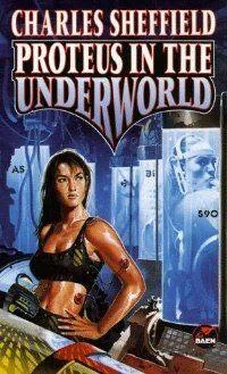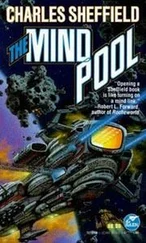Charles Sheffield - Proteus in the Underworld
Здесь есть возможность читать онлайн «Charles Sheffield - Proteus in the Underworld» весь текст электронной книги совершенно бесплатно (целиком полную версию без сокращений). В некоторых случаях можно слушать аудио, скачать через торрент в формате fb2 и присутствует краткое содержание. Год выпуска: 1995, ISBN: 1995, Издательство: Baen Books, Жанр: Фантастика и фэнтези, на английском языке. Описание произведения, (предисловие) а так же отзывы посетителей доступны на портале библиотеки ЛибКат.
- Название:Proteus in the Underworld
- Автор:
- Издательство:Baen Books
- Жанр:
- Год:1995
- ISBN:0-671-87659-7
- Рейтинг книги:3 / 5. Голосов: 1
-
Избранное:Добавить в избранное
- Отзывы:
-
Ваша оценка:
- 60
- 1
- 2
- 3
- 4
- 5
Proteus in the Underworld: краткое содержание, описание и аннотация
Предлагаем к чтению аннотацию, описание, краткое содержание или предисловие (зависит от того, что написал сам автор книги «Proteus in the Underworld»). Если вы не нашли необходимую информацию о книге — напишите в комментариях, мы постараемся отыскать её.
Proteus in the Underworld — читать онлайн бесплатно полную книгу (весь текст) целиком
Ниже представлен текст книги, разбитый по страницам. Система сохранения места последней прочитанной страницы, позволяет с удобством читать онлайн бесплатно книгу «Proteus in the Underworld», без необходимости каждый раз заново искать на чём Вы остановились. Поставьте закладку, и сможете в любой момент перейти на страницу, на которой закончили чтение.
Интервал:
Закладка:
“Why not? If you wish to return, and if you believe that what you have will interest me. And with one other condition: next time, give me advance notice of any possible visit. The hounds are not dangerous, you know that.” Wolf started the skimmer’s engine, then quickly stepped ashore. “But it could be fatal to assume that nothing on this island is dangerous to an unexpected visitor.”
Startled, Sondra glanced up at him. His face was no more than an inscrutable pale oval in the near-darkness. She turned to gaze at the hulking deformed pyramid of rock that formed the center of Wolf Island. It seemed larger than before, the island’s dark heart looming black against the evening sky.
The skimmer moved silently away from the jetty and began the long journey north; but the brooding obsidian hill remained in Sondra’s memory, long after the island itself had vanished into the night.
Wolf watched the little vessel as it disappeared into the fading line between sea and sky. As the day ended, his work could begin. The bees in one of the hives had swarmed that morning. He had followed them up the rocky central hill of Wolf Island and carefully noted the location of the tight swarmed cluster. Now with the temperature dropping and the bees somnolent it was time for the next step.
Bey retraced his path up the hill with an empty container and a monofilament cutter. When he returned he was carrying the swarm, undisturbed and in the precise order in which it had been created. He had learned on his previous tries that it was not enough to follow the normal beekeeping practice of shaking the bees of the swarm into the container. For his plans, order seemed to be vitally important.
He went back into the house and descended two levels from the main floor. The lab that he came to had been cut from the solid basement rock of Wolf Island. Bey had not lied to Sondra. He did need solitude—for the freedom from vibration and noise that it provided, and for the absence of inquisitive neighbors which remoteness guaranteed. What he was doing was not illegal, but it was certainly the sort of thing that might raise eyebrows.
Bey suspended the swarm of bees above a table, from which it could be moved directly into any one of the waiting form-change tanks. Once the swarm was in position he paused. Even with the aid of his miniaturized servos, what came next was going to be infinitely tricky and tedious. He was not going to enjoy the next twelve to fourteen hours. He had to attach tiny optical fibers for biofeedback control to every bee in the swarm, then network the result into the computer so that responses were possible on both the individual and the composite level.
No point in waiting. The work could not be split into shifts, it had to be done in one long session. The sooner he began, the sooner he would be able to rest. Bey sighed, adjusted the microscope, and settled to his task. It called for great care but little brain work. He had plenty of time to think, and to wonder again if he really knew what he was doing.
The idea behind his new work derived from the multiform theory that Bey himself had invented four years earlier, for the creation of human composites. Now he wanted to take it far beyond the point that anyone else-Sondra Dearborn, or even the workers at the Biological Equipment Corporation—would believe possible. The use of biological form- change for humans was two hundred years old, widespread, and almost universally accepted. The corollary, that humans and humans alone could achieve such interactive form-change, was embedded so deeply in society that it had become the definition of humanity itself.
Sondra, like Bey himself, was too young to remember the great humanity debates. She accepted their final outcome as a necessary and inevitable truth.
What is a human? The answer, slowly evolved and at last articulated clearly, was simple: an entity is human if and only if it can accomplish purposive form-change using bio-feedback systems. That definition had prevailed over the anguished weeping of billions of protesting parents. The age of humanity testing had been pushed back, to one year, to six months, to three months. Failure in the test carried a high price—euthanasia—but resistance had slowly faded in the face of remorseless population pressure. Resources to feed babies who could never live a normal human life were not available.
And in time the unthinkable had become the unquestionable. The validity of the humanity test had been established beyond doubt over the years, by attempts to induce form-change in everything from gnats to whales to daffodils. Every one had been unsuccessful.
Now Bey was questioning the unquestionable. The development of the multiforms had made him re-evaluate his own deepest assumptions about form-change—things that everyone “knew must be true,” commonsense things like the earth being flat, or the sun going round the earth, or atoms being indivisible, or nothing being able to travel faster than light. Humans could operate as a multiform ensemble in a form-change environment, but not if more than six people were involved. Therefore, composites behaved differently in form-change than their individual units. Nothing surprising there. An individual cell from a human being did not respond to form-change feedback stimuli at all.
But a colony of social insects, bees or ants or termites, was a single, functioning entity. A hive possessed a complex structure and a survival capability that far transcended those of individual-and expendable-bees.
Three years ago, Bey had examined the long history and literature of form-change and found it wanting. The data he was looking for on social insects did not exist. He would have to create it. What he had not expected was that it would take so long.
Bey straightened his aching back, leaned away from the microscope, and glanced up at the wall clock. Sondra’s skimmer journey should be over, and she would now be flying back to Form Control headquarters. She didn’t know it but she had been given a tough job, one too hard for someone of her experience. The Carcon Colony was likely to eat her alive. While he, of course, sat loafing around in his rocking-chair.
Bey smiled to himself. Sondra’s energy and directness pleased him in a way that he found hard to define. He began to examine the tendriled tangle of fibers, sprouting like white hair from one side of the swarm’s dark mass. The night’s work was just beginning. By dawn, if he were industrious and lucky, he would be finished with the connections. And then he would be ready for the more difficult next stage.
Bey was industrious, but not lucky. Minor movements within the swarm forced him to re- define part of the network. By the time that he placed the final assembly into a form-change tank, adjusted the settings, and emerged from the basement lab, the sun was high in the sky.
He peered out at a day that promised high wind and rain. He closed the house, helped himself to a hot drink, and collapsed into bed. Before he closed his eyes he set the skull contacts into position and programmed four hours of deep sleep. He would be awakened early only if there were a disastrous failure in the lab, or a high-priority call was received at Wolf Island.
Bey was forced back to consciousness by a house signal buzzing urgently at his ear. Even before he sat up he knew that he had slept no more than two hours. His eyes did not want to focus, his mouth was dry, and his whole brain felt grainy.
He removed the contacts from his temples and turned at once to the status monitors. If the swarm was disintegrating so soon, after all his work …
Everything in the lab reported as normal. There had been no change of status in the tank, which was as it should be so early in the experiment.
It meant that the house had chosen to waken him based on some urgent external signal, a call at a level high enough to override Bey’s own demand for rest. He keyed die communications system. An image popped into view instantly, projected into the viewing area beyond the bed.
Читать дальшеИнтервал:
Закладка:
Похожие книги на «Proteus in the Underworld»
Представляем Вашему вниманию похожие книги на «Proteus in the Underworld» списком для выбора. Мы отобрали схожую по названию и смыслу литературу в надежде предоставить читателям больше вариантов отыскать новые, интересные, ещё непрочитанные произведения.
Обсуждение, отзывы о книге «Proteus in the Underworld» и просто собственные мнения читателей. Оставьте ваши комментарии, напишите, что Вы думаете о произведении, его смысле или главных героях. Укажите что конкретно понравилось, а что нет, и почему Вы так считаете.












